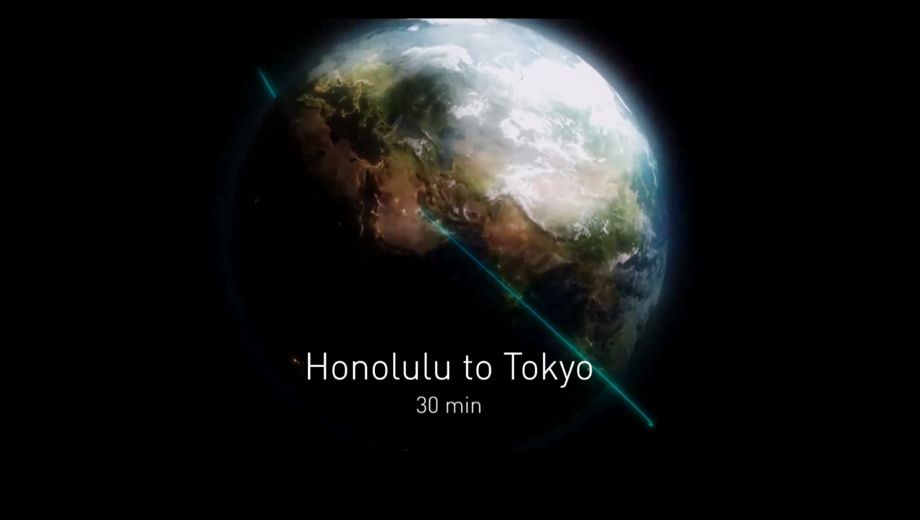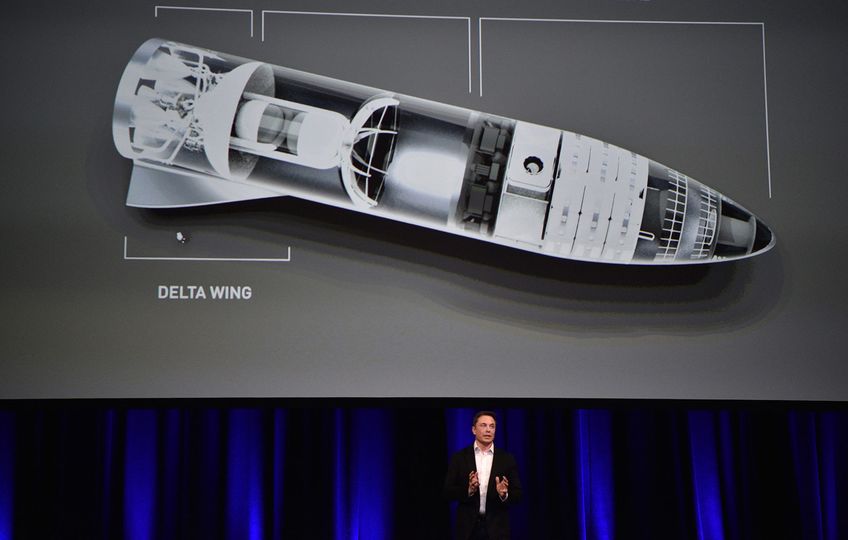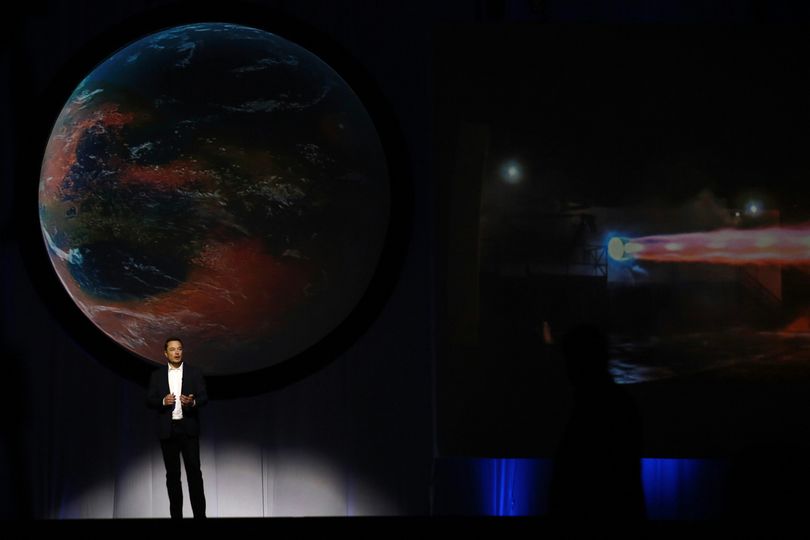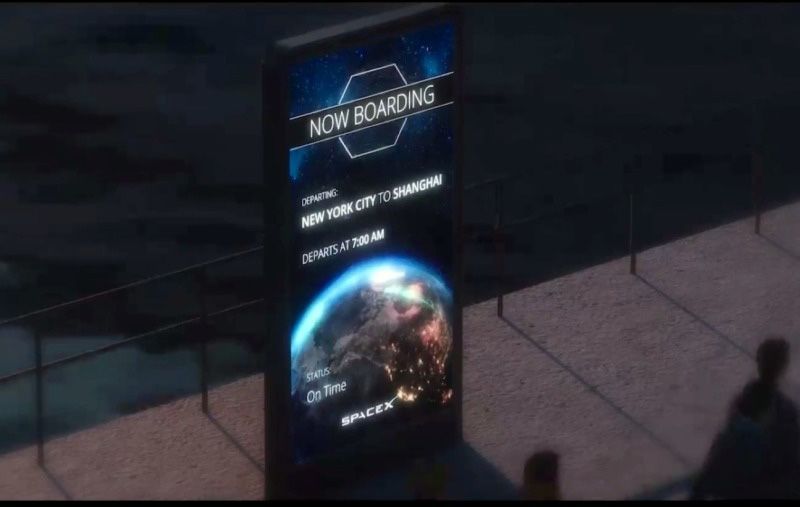Elon Musk wants to get you anywhere on Earth in under one hour

Entrepreneur Elon Musk, who has long dreamed of creating a human colony on Mars, is planning to build a new rocket ship code named “BFR” capable of traveling anywhere on Earth in under an hour.
If the concept becomes reality, Musk said a journey from New York to Shanghai can be done in about 30 minutes.
The surprise announcement means that his Space Exploration Technologies Corp., which has already disrupted the aerospace industry with reusable launches, plans to ferry humans not just to distant planets but across this one as well, setting up a potentially competitive challenge to the commercial airline industry.
“If we are going to places like Mars, why not Earth?” Musk said Friday at the 68th International Astronautical Congress in Adelaide.
Toward the end of Musk’s highly technical presentation, animation played on a big screen behind him, showing scores of people getting on a high-speed ferry in New York, then boarding the BFR on a platform in the water. The spaceship then travels to Shanghai in roughly half an hour.
"Fly to most places on Earth in under 30 mins and anywhere in under 60," Musk wrote in an Instagram post after he’d left the stage without taking questions. "Cost per seat should be about the same as full fare economy in an aircraft. Forgot to mention that."
The BFR would contain 40 cabins capable of ferrying roughly 100 people at a time.

With many commercial satellite operators as customers, the revenue from those contracts will help fund the development of the BFR, which would be capable of carrying satellites to orbit, crew and cargo to the International Space Station, and complete missions to the Moon and Mars, said Musk.
Red Dragon
Musk, 46, has a net worth of roughly US$21 billion and has said in the past he’d use his own personal assets to help fund his vision. He first detailed his Mars plans in a talk at the IAC in Guadalajara, Mexico, a year ago and later published a paper about it, generating enormous excitement but raising concerns it included few details on financing.
Musk promised his Twitter followers this summer that his updated Mars plan would address the lack of payment details – which he called “the most fundamental flaw” in his first take.
Previously, Musk had talked about sending an unmanned "Red Dragon" spacecraft to Mars in 2018. That plan, as well as the spacecraft, has been shelved. The new plan calls for the first BFR to land on Mars in 2022, followed by crewed missions in 2024.
Musk, who is also CEO of electric-car maker Tesla, founded SpaceX in 2002 with the ultimate goal of enabling people to live on other planets. The closely-held space exploration company currently flies the Falcon 9 rocket for customers that include NASA, commercial satellite operators and the U.S. military. The Hawthorne, California-based company also has plans to launch its own satellite network.
Drone ships
The cost of a Falcon 9 launch is roughly US$62 million, according to SpaceX’s website, with modest discounts available for contractually committed, multi-launch purchases. SpaceX’s rockets are designed for reuse, with rocket reusability now seen as key to making space travel affordable.
SpaceX celebrated its first launch using a previously flown booster in March and regularly recovers the rocket’s first stage on land or on "drone ships" at sea.
SpaceX has completed 13 launches so far this year and has several missions on its manifest, including back-to-back launches slated for October 7th and October 9th.
Musk said the first test flight of Falcon Heavy, a far more powerful rocket capable of heavy payloads and sending paying space tourists on a flight around the moon, will occur "hopefully towards the end of the year," but that date has already slipped several times.
It appears that the BFR, which is in development, would ultimately replace the Falcon 9, the Falcon Heavy and the Dragon spacecraft, which currently ferries supplies to the International Space Station.
Onwards to Mars
Mars is no longer the stuff of science fiction. Mars exploration got an enormous boost in August 2012, when NASA’s Curiosity Rover landed on the Red Planet.
The robotic vehicle continues to transmit breathtaking, high-resolution photographs of the dune-and butte-filled landscape to the delight of scientists and Curiosity’s 3.8 million Twitter followers.
Still, human colonization of Mars won’t be easy. Getting there will take several months, with unknown risks to the human body and psyche.
Even if space explorers survive the 155 million-mile journey and subsequent first-ever manned landing, they would need to get to work immediately to create a habitable atmosphere, find water and produce the fuel needed to propel the rocket ship homeward. And Musk is famous, in part, for his aspirational timelines.
"SpaceX is in the business of making the impossible possible," said Phil Larson, a former space policy adviser to President Barack Obama who worked for SpaceX and is now at the University of Colorado-Boulder.
"Using the same principles, and diverse funding approach, that have taken them from their first launch 9 years ago to where they are today, it makes this seem within the realm of possibility."


Qantas - Qantas Frequent Flyer
09 May 2013
Total posts 144
Love this guy! I think he wakes up every day and thinks status quo is not good enough, we won't just improve it, we will just reshape it.
Qantas - Qantas Frequent Flyer
18 Jun 2015
Total posts 57
It’s certainly possible already with today’s technology, just needs to convince that this is as safe as air travel.
Qantas - Qantas Frequent Flyer
28 Aug 2014
Total posts 213
Not physically possible on Mars. You need a magnetosphere to prevent solar radiation blowing the atmosphere away, and Mars' molten iron core went cold and stopped turning billions of years ago.
01 Jan 1970
Total posts 0
The problem with this vision, as has been pointed out often at scientific and engineering conferences on this subject, is G-forces. We have the technology to get from one point of the Earth to anywhere on Earth within an hour - less even - but if we have to be alive when we get there, particularly without special training and fitness screening, it would have to be slower and thus take longer.
31 Mar 2016
Total posts 619
@rickylee:
03 Sep 2017
Total posts 49
When this mode of travel becomes available, then the normal flying will be relegated to a sort of luxury cruise style, just like what happened to travelling by ship. Would be interesting what will become of the current mode of air travel, and how will it transform (or will it ever), or will it be gone altogether?
Qantas - Qantas Frequent Flyer
18 Jun 2015
Total posts 57
I’m guessing planes will still do the short haul and medium haul routes while the rockets could be reserved for very premium and long distance routes such as London-NYC or NYC-HK, etc.
Hi Guest, join in the discussion on Elon Musk wants to get you anywhere on Earth in under one hour